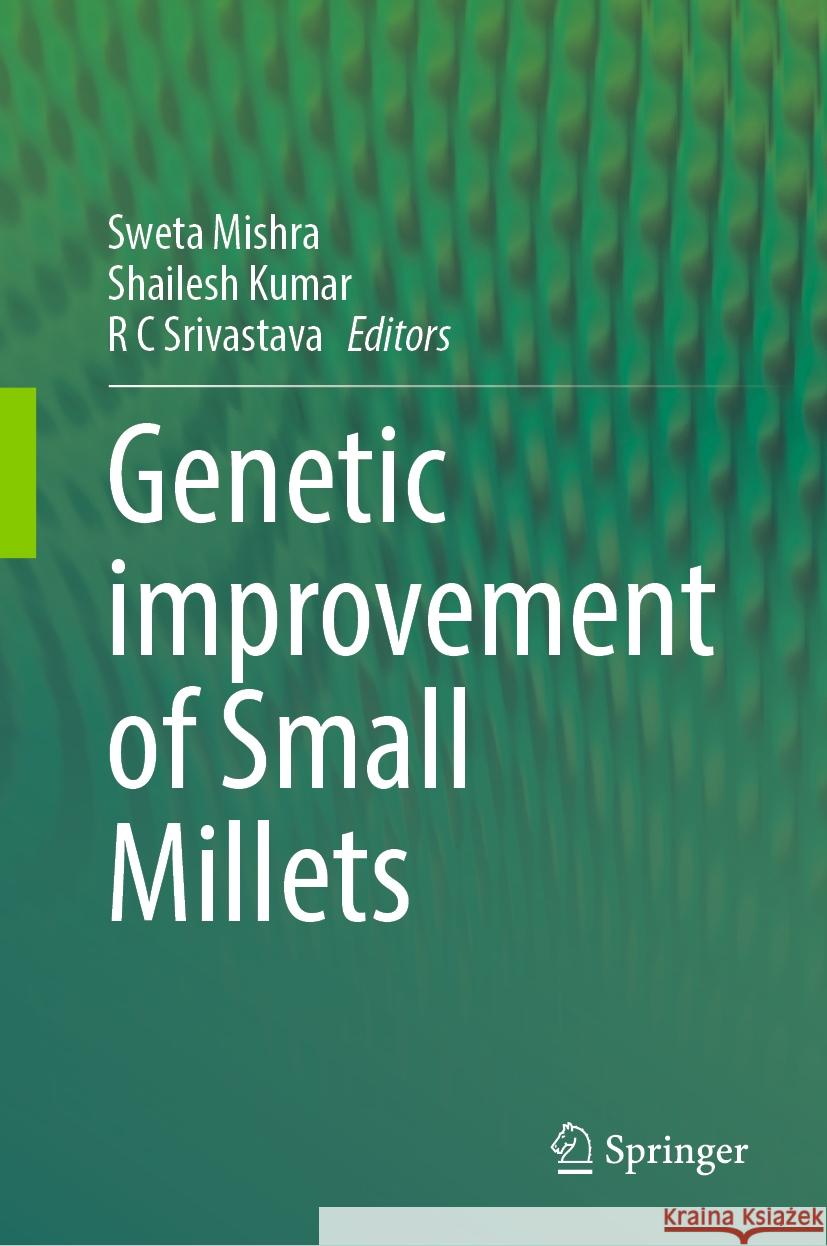Genetic Improvement of Small Millets » książka



Genetic Improvement of Small Millets
ISBN-13: 9789819972319 / Angielski
Genetic Improvement of Small Millets
ISBN-13: 9789819972319 / Angielski
(netto: 1078,52 VAT: 5%)
Najniższa cena z 30 dni: 1079,53
ok. 16-18 dni roboczych.
Darmowa dostawa!
Attached
About the Editors
Dr Sweta Mishra
Dr Sweta Mishra is working as Professor and Head, Department of Genetics and Plant Breeding and is Principal Investigator of the Small Millets scheme at Dr Rajendra Prasad Central Agricultural University, Pusa, Bihar. She specializes in molecular plant breeding. She has 18 years of teaching and research experience in the capacity of assistant professor, associate professor, and professor in various organizations in different states of India. She has guided many MSc and PhD students. She has successfully handled two international, six national, and eight state-funded research projects as PI and Co-PI. She has worked in different crops like finger millet, foxtail millet, proso millet, barnyard millet, wheat, basmati rice, pigeonpea, date palm, olives, jatropha, simarouba, noni, tomato, etc. Presently, she is the PI for AICRP Small Millets and is committed for reviving the lost glory of millets. She is working for the genetic improvement in small millets, area expansion, enhanced production and productivity, and value addition and processing. She has developed several technologies and varieties. She has contributed tremendously to the scientific literature in the form of several books, research papers, book chapters, articles, training manuals, folders, bulletins, etc. She has also been bestowed upon with several awards.
Dr. Shailesh Kumar
Dr. Shailesh Kumar, Assistant Professor, is serving in the Department of Botany, Plant Physiology and Biochemistry, College of Basic Sciences and Humanities, Dr. Rajendra Prasad Central Agricultural University since 2006. Dr. Shailesh Kumar obtained his BSc (Ag.) from Banaras Hindu University, Varanasi, Master degree in Plant Physiology, and PhD in Plant Physiology from Indian Agricultural Research Institute, New Delhi. He has qualified CSIR-NET and ICAR-NET. Dr. Shailesh Kumar has been teaching plant physiology and environmental science courses at undergraduate, and plant physiology courses at postgraduate and doctorate levels. He has been undertaking research in plant physiology, plant tissue culture, and medicinal and aromatic plants. He has supervised PhD, MSc, and BTech (Biotech) students. Dr. Kumar is a member of several scientific societies and is a member of editorial board of several journals. He has many research publications and books to his credit.
Dr R. C. Srivastava
Dr R.C. Srivastava was the former Vice Chancellor of Dr Rajendra Prasad Central Agricultural University, Pusa, Bihar, from 2016 to 2022. He specializes in rain water management, integrated farming system, ground water management, monetization of agricultural waste, and climate change. He has held the positions of Director, Central Agricultural Research Institute (ICAR), Port Blair, Andaman and Nicobar Islands. He has served Indian Council of Agricultural Research, India, in various capacities as scientist, senior scientist, and principal scientist. He has developed many technologies, has patents, and has several research publications to his credit. He has received many awards including the Rafi Kidwai Award, Rajendra Prasad Award, etc.
This book brings out a comprehensive collection of information on small millets. The main focus of this book is to introduce the various types of long forgotten small millets to the readers, their genetics, botany and diversity, cultivation, breeding strategies, genomic resources available, how they can be incorporated into the existing cropping systems, their processing strategies and value addition to incorporate into daily diet of humans. It covers finger millet, foxtail millet, proso millet, barnyard millet, little millet, kodo millet, and browntop millet.
Millets originated before 10000 BC and were consumed by humans across civilizations until the green revolution took place in India and other developing countries. After green revolution, due to the advent of high-yielding varieties, as the area, production, and market of wheat and rice increased, the acreage of millets gradually decreased. However, with increasing lifestyle diseases, humans have recognized the potential of small millets crop. It is now being considered as super food and smart food as they are nutri-packed and rich in calcium, phosphorous, iron, zinc, and fiber, which is much higher than that available in wheat and rice.
This book is of interest to the students, research scholars, national and international agricultural scientists, millet professionals, and food industry1997-2026 DolnySlask.com Agencja Internetowa
KrainaKsiazek.PL - Księgarnia Internetowa









